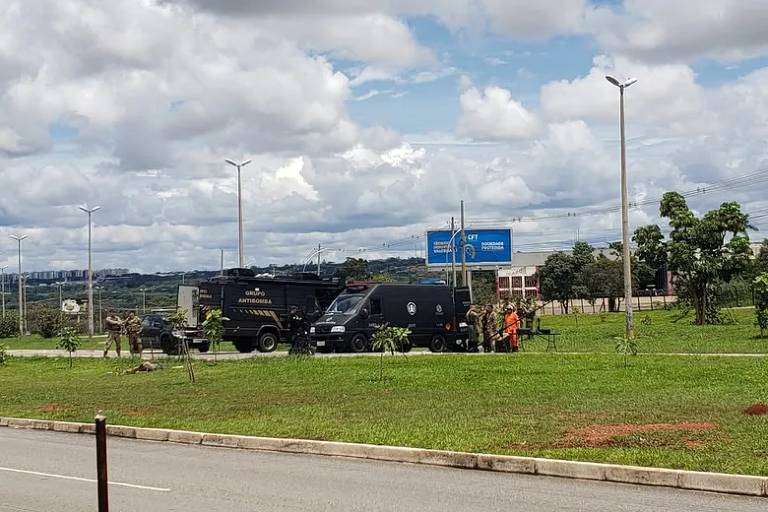While an idle uncle spends his afternoons in front of the barracks eating barbecue and asking for a coup, his beer partner plans a bomb attack to terrorize the country. Incited by Bolsonaro and tolerated by law enforcement agents, the executors of terror can kill you under the flags of patriotism and freedom. It's not delirium, it's a well thought through, financed and authorized plan.
On December 12, the day of the official confirmation of Lula's electoral victory, the coordinated violence in the streets of Brasilia finally demonstrated, for those who doubted it, that the rebels who blocked highways and then camped in military districts are involved in criminal activity. And they do benefit from the complacency of government and military leaders.
Cars and buses burned in the streets evidenced the nature of the movement. Intelligence authorities not only failed to monitor these radical groups, but cherished them in practice and in discourse. It never worked that way with movements that call for social justice.
The crimes committed by citizens and authorities of different levels involves: violent abolition of the democratic rule of law (article 359-L, of the Crimanl Code); incitement (art. 286); criminal association (art. 288); crime of improper omission by authorities who have a duty to protect individuals and property. In addition, there were also a varied set of related crimes: damage, arson, attempted murder, etc.
A few days later, by chance (and on the advice of a suspicious citizen), a plan for a large-scale bomb attack was discovered. A businessman planned to provoke "declaration of a state of siege" and "intervention by the Armed Forces". The explosion would occur in the vicinity of the airport and of a power station. An arsenal of weapons and illegal explosives was found in his house.
There has been silence from governmental palace.
We don't know what might happen at Lula's presidential inauguration on Sunday. It is not a generic, ordinary and unpredictable danger, which is present in any major event. It is a specific, extraordinary and predictable danger, facilitated by the leniency of authorities unresigned by the electoral defeat; and by illegally armed civilian groups steeped in Bolsonarist extremism.
Jurists and lawyers have been discouraging political analysts from using the term "terrorism" to name what we are witnessing. They contend that, under Brazilian law, the crime of terrorism only occurs when acts that intend to provoke generalized panic are motivated by "xenophobia, discrimination or prejudice based on race, color, ethnicity and religion", not by "political manifestations". There are a variety of crimes, but not "terrorism" properly so called.
The legal caveat ("by Brazilian law, the crime is not terrorism") is right. The terminological recommendation ("don't talk about terrorism") is wrong. Because law and jurists do not have a monopoly on the critical language of politics and morals.
If Al Qaeda airplanes knocked down the twin towers of the Brazilian National Congress, Brazilian law would not qualify it as a crime of terrorism. But it would be terrorism nonetheless according to its almost universal concept (present not only in foreign laws and international conventions, but in social theory): a violent act, with the potential to cause massive damage to life and infrastructure, which affects innocent civilians and generates panic to intimidate the population and government.
Bolsonarism, it turns out at this stage, opens up its terrorist face. A face already present at the origin of the public biography of Bolsonaro himself, who threatened to blow up bombs against military premises for better wages in the 1980s (read the book "The cadet and the captain", by Luiz Maklouf).
There are primary approvers and accomplices of terror: Bolsonaro himself, who combines seclusion since his defeat with coded incitements for his followers to "defend the homeland"; the Armed Forces, which do not publicly reject requests for a coup, support attacks on the electoral result, allow hallucinated interpretations of art. 142 of the Constitution that claim for military intervention, and tolerate extremists camping in their backyard; and the attorney general, whose omission is widely known.
Augusto Aras is the first attorney general in history to be publicly urged to act by state prosecutors. He practices the art of illusionistic gestures and innocuous public statements. He interpreted coup movements as an "undesirable but understandable aftermath"; he assured that he "monitors" protests and recalled that he created a "group to combat terrorism". Such group did nothing concrete so far, except to provoke involuntary laughter in Flávio Dino.
Dino, a de facto minister of justice, not yet a de jure minister of justice, already practices acts of government. Justice Alexandre de Moraes suspended the carrying of weapons in Brasília for the next few days. Bolsonaro might leave the country before Lula's innauguration on a trip to Miami with extensive use of public resources. The legality of this disguised escape, if it occurs, is farcical. The end of Bolsonaro's presidency is pathetic. And he leaves orphans in the barracks.
Read the article in the original language
